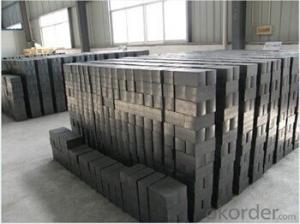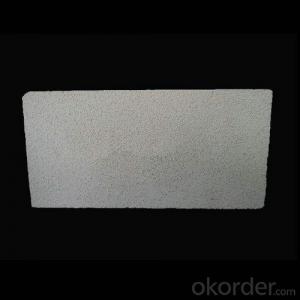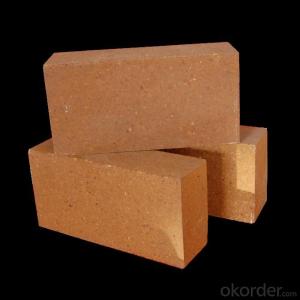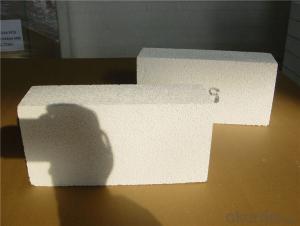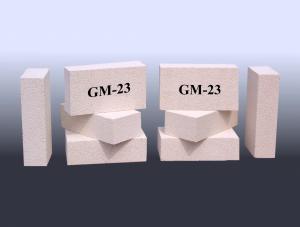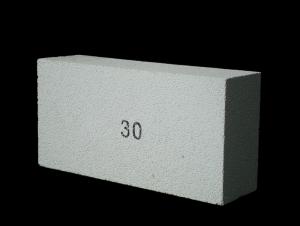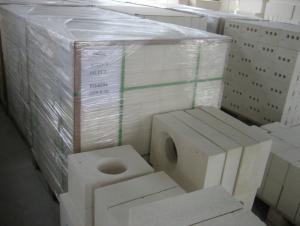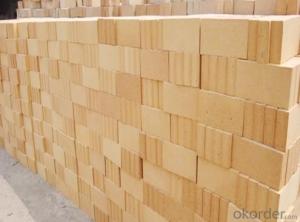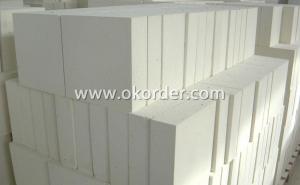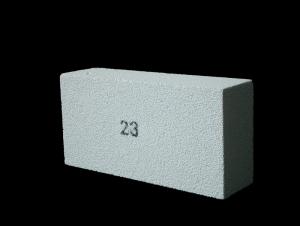Hot blast stove refractory brick
- Loading Port:
- China Main Port
- Payment Terms:
- TT OR LC
- Min Order Qty:
- -
- Supply Capability:
- -
OKorder Service Pledge
OKorder Financial Service
You Might Also Like
Specifications
Fire brick1.ISO 9001 approved,
2.With high quality and competitive price,
3.Standard and special shape.
Fire-clay refractory brick.
1. N-1
AL2O3 (%)>42
Refractoriness >1750
Refractoriness under load KD>1400
Permanent linear change onreheating
1500*2h
1450*2h
1400*2h:+0.1; -0.4
Apparent Porosity(%)<22
Cold crushing strength (Mpa)>29.4
2. N-2a
AL2O3 (%)>40
Refractoriness >1730
Refractoriness under load KD>1350
Permanent linear change onreheating
1500*2h
1450*2h
1400*2h:+0.1; -0.5
Apparent Porosity(%)<24
Cold crushing strength (Mpa)>24.5
High-alumina refractory brick
1. LZ-75
AL2O3 (%)>75
Refractoriness>1790
Refractoriness under load KD>1520
Permanent linear change onreheating
1500*2h:+0.1; -0.4
1450*2h
1400*2h
Apparent Porosity(%)<23
Cold crushing strength (Mpa)>53.9
2. LZ-65
AL2O3 (%)>65
Refractoriness >1790
Refractoriness under load KD>1500
Permanent linear change onreheating
1500*2h:+0.1; -0.4
1450*2h
1400*2h
Apparent Porosity(%)<23
Cold crushing strength (Mpa)>49
3.LZ-55
AL2O3 (%)>55
Refractoriness >1770
Refractoriness under load KD>1470
Permanent linear change onreheating
1500*2h:+0.1; -0.4
1450*2h
1400*2h
Apparent Porosity(%)<22
Cold crushing strength (Mpa)>44.1
4.LZ-48
AL2O3 (%)>48
Refractoriness >1750
Refractoriness under load KD>1420
Permanent linear change onreheating
1500*2h
1450*2h:+0.1; -0.4
1400*2h
Apparent Porosity(%)<22
Cold crushing strength (Mpa)>39.2
Fire clay brick SK-32 | |
Item | Standard |
AI2O3(%) | 30 |
Fe2O3 (%) | 3.5 |
Refractoriness (SK) | 32 |
Refractoriness under load, 0.2MPa, Ta, (°C) | 1300 |
Porosity (%) | 22-26 |
Bulk density (g/cm³) | 2.05 |
Cold crushing strength (MPa) | 25 |
Thermal expansion at 1000°C (%) | 0.6 |
Fire clay brick SK-34 | |
Item | Standard |
AI2O3(%) | 38 |
Fe2O3 (%) | 2.5 |
Refractoriness (SK) | 34 |
Refractoriness under load, 0.2MPa, Ta, (°C) | 1350 |
Porosity (%) | 19-23 |
Bulk density (g/cm³) | 2.10-2.15 |
Cold crushing strength (MPa) | 25 |
Thermal expansion at 1000°C (%) | 0.6 |
Fire clay brick SK-36 | |
Item | Standard |
AI2O3(%) | 50 |
Fe2O3 (%) | 2 |
Refractoriness (SK) | 36 |
Refractoriness under load, 0.2MPa, Ta, (°C) | 1450 |
Porosity (%) | 20-24 |
Bulk density (g/cm³) | 2.30-2.40 |
Cold crushing strength (MPa) | 45 |
Thermal expansion at 1000°C (%) | 0.3 |
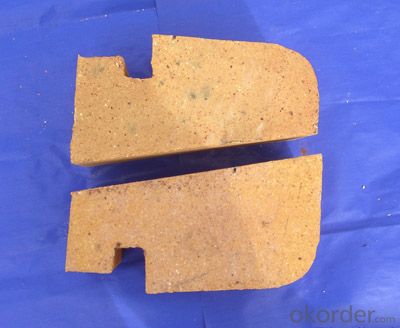
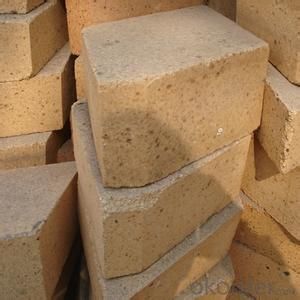
- Q:Are insulating fire bricks resistant to impact or mechanical stress?
- Indeed, insulating fire bricks exhibit resistance against impact and mechanical stress. These bricks are crafted using lightweight refractory materials, purposefully formulated to endure extreme temperatures and thermal shock. Their composition is specifically engineered to possess exceptional resilience against mechanical stress and impact, rendering them appropriate for a multitude of applications in which external forces or pressure may be exerted upon them. Remarkably, these bricks retain their structural integrity and durability, safeguarding their shape and thermal insulation attributes even when subjected to mechanical stress or impact. Consequently, they are highly recommended for deployment in furnaces, kilns, and other environments characterized by elevated temperatures.
- Q:Can insulating fire bricks be used in the construction of pottery extruders?
- Yes, insulating fire bricks can be used in the construction of pottery extruders. These bricks are known for their high heat resistance, low thermal conductivity, and excellent insulating properties, making them suitable for applications where high temperatures are involved, such as pottery extrusion. They can help maintain a consistent temperature within the extruder, ensuring optimal working conditions for the clay and improving overall efficiency.
- Q:Can insulating fire bricks be used in pizza ovens or outdoor grills?
- Yes, insulating fire bricks can be used in pizza ovens or outdoor grills. These bricks are designed to withstand high temperatures and provide excellent insulation, making them ideal for retaining heat and creating consistent cooking conditions in pizza ovens and grills.
- Q:Clay insulation bricks insulation, brick and ordinary clay brick, fireclay, brick distinction, and its use? Thank you
- Thermal insulation brick is a new type of energy-saving building insulation technology with inorganic composite material as the main material. It is an ideal technology to replace the traditional wall insulation.
- Q:Can insulating fire bricks be custom-made?
- Yes, insulating fire bricks can be custom-made. Insulating fire bricks are typically made from lightweight materials such as vermiculite, perlite, or refractory fibers, which can be easily molded into various shapes and sizes. This flexibility allows manufacturers to create custom-made insulating fire bricks to meet specific requirements and applications. Customization options may include variations in dimensions, thermal conductivity, compressive strength, and density. By tailoring the composition and design of insulating fire bricks, they can be optimized for specific temperature ranges, insulation requirements, and environmental conditions. Therefore, customers can work with manufacturers to develop custom solutions that best suit their unique needs.
- Q:Do insulating fire bricks require any special curing or firing process before use?
- No, insulating fire bricks do not typically require any special curing or firing process before use. Insulating fire bricks are designed to be used as a form of insulation in high-temperature applications such as kilns, furnaces, and fireplaces. These bricks are made from lightweight materials that have high insulating properties, allowing them to withstand extreme temperatures while minimizing heat loss. Unlike traditional fire bricks, which are made from dense and heavy materials, insulating fire bricks are manufactured using a combination of lightweight aggregates and refractory clay. This composition gives insulating fire bricks their excellent thermal insulation properties. Due to their lightweight nature and low thermal conductivity, insulating fire bricks do not require any special curing or firing process before use. They can be installed directly in the desired application without any prior treatment. However, it is essential to ensure that the bricks are properly aligned and securely placed to maximize their insulating capabilities. It is worth noting that individual manufacturers may provide specific instructions or recommendations for the installation and use of their insulating fire bricks. Therefore, it is always advisable to consult the manufacturer's guidelines to ensure proper installation and usage of these bricks.
- Q:Are insulating fire bricks resistant to insect infestation?
- Insulating fire bricks do not possess specific resistance against insect infestation. They are primarily utilized for their thermal insulation properties in applications involving high temperatures, such as kilns, furnaces, and fireplaces. Although they are generally not prone to insect damage, they are not entirely impervious to it either. Insects can still infiltrate the bricks if they discover small cracks or openings in the material. Nevertheless, insulating fire bricks are typically dense and compact, thereby making it challenging for insects to burrow or establish nests within them. It is always advisable to employ preventive measures for managing and eliminating potential insect infestations in any construction material, including insulating fire bricks, to ensure their durability and effectiveness.
- Q:Can insulating fire bricks be used in the construction of melting furnaces?
- Yes, insulating fire bricks can be used in the construction of melting furnaces. Insulating fire bricks are designed to withstand high temperatures and have excellent thermal conductivity. They are specifically engineered to reduce heat loss and conserve energy, making them ideal for use in melting furnaces. In addition, insulating fire bricks are lightweight and easy to handle, making them convenient for construction purposes. They can effectively retain heat and maintain a stable temperature within the furnace, ensuring efficient melting and casting processes. Furthermore, insulating fire bricks are resistant to chemical corrosion and mechanical stress, making them durable and reliable for long-term use in melting furnaces. Overall, insulating fire bricks are a suitable choice for constructing melting furnaces due to their thermal properties, ease of use, and durability.
- Q:Can insulating fire bricks be used for insulation in chemical reactors?
- Yes, insulating fire bricks can be used for insulation in chemical reactors. Insulating fire bricks are designed to have excellent thermal insulation properties, high temperature resistance, and low thermal conductivity, making them suitable for insulating and maintaining high temperatures in chemical reactors.
- Q:Are insulating fire bricks suitable for use in boilers?
- Yes, insulating fire bricks are suitable for use in boilers. Insulating fire bricks are designed to withstand high temperatures, making them a suitable choice for various applications, including boilers. These bricks are made from lightweight materials, such as ceramic fibers or vermiculite, which provide excellent thermal insulation properties. They can effectively retain heat within the boiler and prevent heat loss, resulting in improved energy efficiency. Additionally, insulating fire bricks are resistant to thermal shock, chemical attack, and corrosion, ensuring their durability and longevity in boiler applications. Overall, the use of insulating fire bricks in boilers can help optimize their performance, reduce energy consumption, and enhance the overall efficiency of the heating system.
1. Manufacturer Overview |
|
|---|---|
| Location | |
| Year Established | |
| Annual Output Value | |
| Main Markets | |
| Company Certifications | |
2. Manufacturer Certificates |
|
|---|---|
| a) Certification Name | |
| Range | |
| Reference | |
| Validity Period | |
3. Manufacturer Capability |
|
|---|---|
| a)Trade Capacity | |
| Nearest Port | |
| Export Percentage | |
| No.of Employees in Trade Department | |
| Language Spoken: | |
| b)Factory Information | |
| Factory Size: | |
| No. of Production Lines | |
| Contract Manufacturing | |
| Product Price Range | |
Send your message to us
Hot blast stove refractory brick
- Loading Port:
- China Main Port
- Payment Terms:
- TT OR LC
- Min Order Qty:
- -
- Supply Capability:
- -
OKorder Service Pledge
OKorder Financial Service
Similar products
New products
Hot products
Hot Searches
Related keywords






